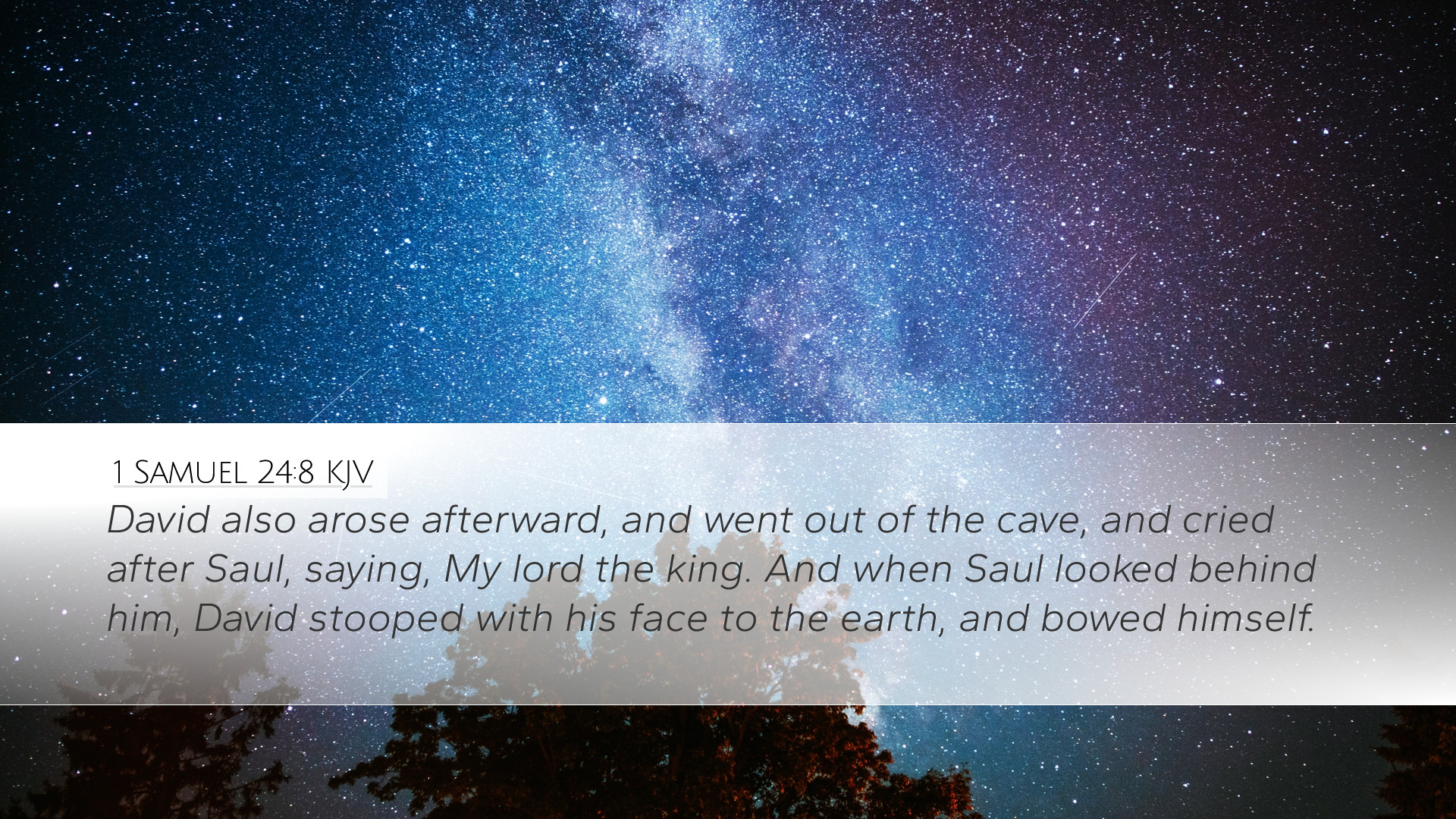Commentary on 1 Samuel 24:8
This passage encapsulates a pivotal moment in the life of David as it relates to his relationship with Saul, the reigning king of Israel. David’s actions and choices reveal deep insights about leadership, mercy, and divine providence that are significant for pastors, students, theologians, and Bible scholars.
Context of the Passage
1 Samuel 24:8 occurs during a time of intense rivalry between David and Saul. Saul, driven by jealousy and fear of losing his throne, seeks to kill David. The chapter depicts a crucial encounter where David has the opportunity to kill Saul but chooses instead to spare his life, leading to profound theological and moral implications.
Key Themes in the Commentary
- The Value of Mercy: David’s decision to spare Saul illustrates a powerful lesson on mercy that resonates throughout Scripture. As noted by Matthew Henry, mercy triumphs over judgment, and this incident highlights David’s respect for God’s anointed.
- Divine Providence: Adam Clarke emphasizes the idea that God’s hand is evident in the events leading up to this moment. David’s rise to power is orchestrated by divine purposes, which reassures believers of God’s sovereignty in human affairs.
- Leadership Principles: Albert Barnes observes that David’s restraint is a quality of true leadership. Leaders are often faced with choices that can either align with personal ambition or fidelity to God’s will. David exemplifies the latter through his actions.
- The Consequences of Sin: The conflict between Saul and David serves as a reminder of the destructive nature of jealousy and sin. Saul’s deteriorating spiritual condition underscores the dangers of turning away from God, a theme echoed in classic commentaries.
Verse Analysis
“Then David also arose afterward, and went out of the cave, and cried after Saul, saying, My lord the king. And when Saul looked behind him, David stooped with his face to the earth, and bowed himself.” (1 Samuel 24:8)
David’s Approach to Saul
David's emergence from the cave signifies both a literal and metaphorical stepping into the light of divine truth. Matthew Henry suggests that David’s respectful calling to Saul, addressing him as “my lord the king,” demonstrates his recognition of Saul's position and God-given authority, despite Saul’s failures.
Symbol of Humility
David bowing before Saul is a profound act of humility. Albert Barnes notes that this posture symbolizes not just respect but also David's internal struggle and surrender to God’s plan. It serves as an essential model for believers in the practice of humility, especially in the face of adversity.
Theological Implications
- God’s Sovereignty: This passage is a testament to God's sovereign control over history and individual lives. The preserving of Saul’s life, despite David's right to take it, is aligned with God’s ultimate purpose.
- Human Agency and Divine Plan: David’s choice reveals the tension between human agency and divine providence. Adam Clarke elaborates on this dynamic, noting that while we are responsible for our choices, these choices are also a part of God’s broader plan.
- Moral Complexity: The narrative illustrates the complexity of moral decisions, especially within leadership contexts. It invites reflection on how leaders manage personal conflict and ethical dilemmas.
Conclusion
1 Samuel 24:8 serves as a rich passage for reflection on themes of mercy, leadership, and divine orchestration in human affairs. The character of David shines as a model of humility, respect for authority, and fidelity to God’s will even amidst personal threat. For pastors, theologians, and students of the Word, this verse continues to inspire discussions on the nature of true strength in leadership and the importance of linking one’s actions to a profound sense of divine purpose.


